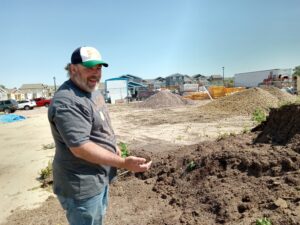
Since the start of 2023, Pikes Peak Habitat for Humanity has successfully transitioned to building all-electric houses in our development at The Ridge at Sand Creek. Previously, a few appliances such as ovens, furnaces, and water heaters in our homes used natural gas. Benefits to this shift away from natural gas include saving homeowners on their monthly utility bills, being able to take advantage of sustainably generated and stored electricity, and increasing safety and reducing health issues for the families who live in these homes, says Construction Superintendent Eric Wells.
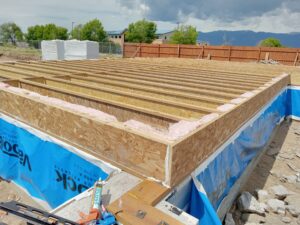 “Natural gas in the house can cause health problems,” he explains. “There are studies that show an increase in health issues like asthma for folks who live in houses with natural gas.”
“Natural gas in the house can cause health problems,” he explains. “There are studies that show an increase in health issues like asthma for folks who live in houses with natural gas.”
Many of our homeowners have children, whom he says are especially susceptible.
“If you’re a kid growing up in a house with natural gas, there’s a higher chance of adverse effects,” he explains. “This is all due to the combustion products of natural gas. Complete combustion would just leave you with carbon dioxide and water; incomplete combustion would potentially turn into carbon monoxide and some not-so-pleasant chemicals.”
Ironically, updates to building codes that are designed to increase energy efficiency have led to greater problems with natural gas.
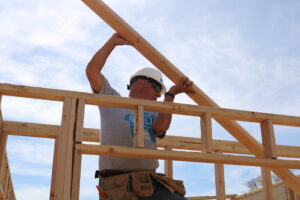 “Codes are requiring houses to be built tighter and tighter and tighter, which can cause effects with exhaust for the natural gas byproducts,” Wells says. For example, installing water heaters with passive exhaust systems — rather than fans — led to backflow. “The house was so tight, when a door was opened, air was pulled in through these exhaust vents going through the roof, bringing natural gas combustion byproducts into the house and causing problems,” he says. “The industry has adapted and created forced-air water heaters for natural gas, and they added a fan that blew the combustion gasses out the exhaust vent, and that solved our backdraft problem.”
“Codes are requiring houses to be built tighter and tighter and tighter, which can cause effects with exhaust for the natural gas byproducts,” Wells says. For example, installing water heaters with passive exhaust systems — rather than fans — led to backflow. “The house was so tight, when a door was opened, air was pulled in through these exhaust vents going through the roof, bringing natural gas combustion byproducts into the house and causing problems,” he says. “The industry has adapted and created forced-air water heaters for natural gas, and they added a fan that blew the combustion gasses out the exhaust vent, and that solved our backdraft problem.”
Even so, and regardless of how carefully a builder follows safety regulations, using natural gas carries inherent risks.
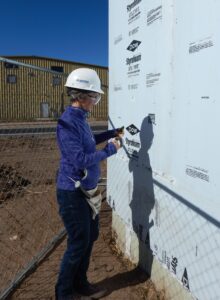 “If the water heater fan was to break down, we would immediately have this backflow problem,” explains Wells. On top of that, “If you have natural gas inside of a house, you literally have fire, a flame, ignition, inside of a house! As safe as appliances are nowadays, there’s still always a chance that an explosion can occur. The chances of an electrical issue happening, especially with modern-day building codes and appliance manufacturing requirements, is far less.”
“If the water heater fan was to break down, we would immediately have this backflow problem,” explains Wells. On top of that, “If you have natural gas inside of a house, you literally have fire, a flame, ignition, inside of a house! As safe as appliances are nowadays, there’s still always a chance that an explosion can occur. The chances of an electrical issue happening, especially with modern-day building codes and appliance manufacturing requirements, is far less.”
As appliances age, the risk can increase. “Folks can’t guarantee, especially in older houses, that appliances aren’t leaking natural gas itself, before it is even burned,” he says. “So flammable gas could work its way into the house, possibly to a point where an explosion occurs, which has happened in the past.”
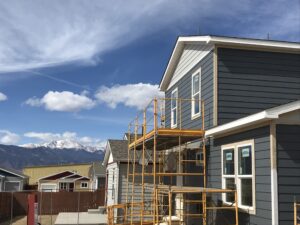 On a financial level, natural gas can’t be replenished. While this may seem like a problem for future generations, there is only so much natural gas on our planet. Electricity, on the other hand, can be created by something we have an abundance of here in El Paso County: sunlight! With that in mind, it makes financial sense to power a home using a source of energy that is freely available, compared to a power source that, once burned, can’t be recovered.
On a financial level, natural gas can’t be replenished. While this may seem like a problem for future generations, there is only so much natural gas on our planet. Electricity, on the other hand, can be created by something we have an abundance of here in El Paso County: sunlight! With that in mind, it makes financial sense to power a home using a source of energy that is freely available, compared to a power source that, once burned, can’t be recovered.
And on a broader level, using natural gas has a negative impact on the climate.
“Natural gas itself is mostly made up of methane, which is a greenhouse gas that’s 28 times more potent than carbon dioxide at trapping heat in the atmosphere,” says Wells. “If that’s being released in the house, it’s obviously being released in the atmosphere, and even though that’s minor, millions and millions of houses have natural gas in them, so it adds up.”
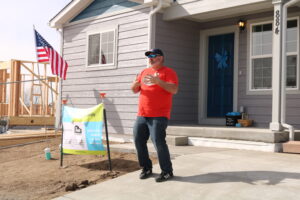
He concludes, “Basically, if the climate change issues surrounding burning fossil fuels isn’t a concern for an individual, they’re still impacted by the adverse health effects that gas and the resulting combustion products can cause inside a house. The demographic we serve, the folks who are in poverty and struggling to make it week to week and paycheck to paycheck, we are seeing that climate change is already affecting them. So not only are we eliminating potential health and safety issues in our houses, but we’re also working to shift our impact on the climate.”

